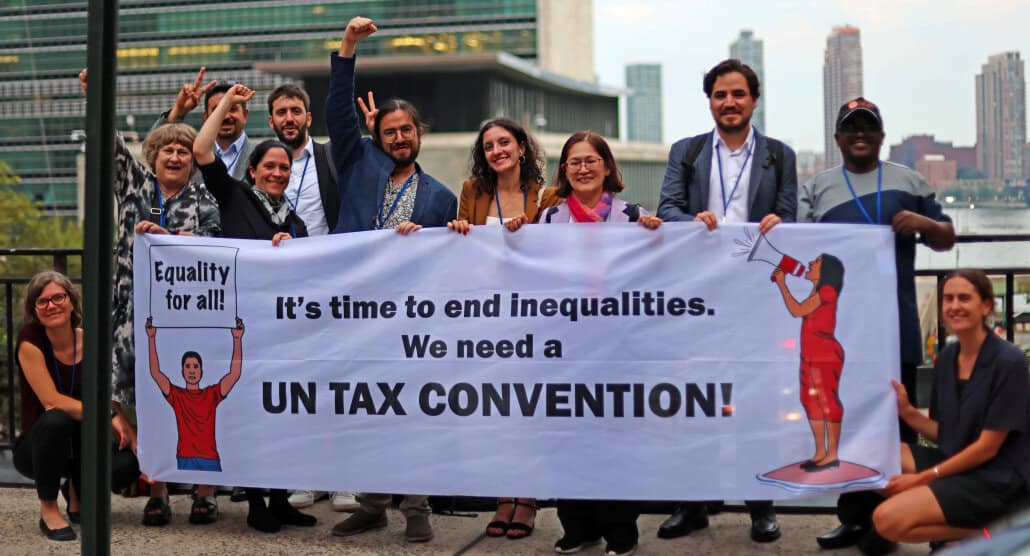Image: Civil Society Financing for Development Mechanism
The global system of taxation is profoundly unequal, and long overdue for change.
Global tax rules tend to favour developed countries, to a large degree because the Organisation for Economic Cooperation and Development (OECD) is the de facto rule setter, and has been for over 60 years. Those rules are decided opaquely and non-inclusively by its members – several of whom operate harmful, lucrative tax havens and who would no doubt prefer the status quo to continue. In the past, agreements reached during OECD negotiations have failed to meet the needs of Global South countries.
This is the very OECD whose motto is Better policies for better lives, and who claims to “shape policies that foster prosperity, equality, opportunity, and well-being for all”, all the while doing the most to help multinational firms bend the tax rules.
As a result, for several years now there have been calls to shift the responsibility for setting global tax rules from the OECD to the UN, a move which is expected to help to cut down on global tax abuse, illicit financial flows, tax avoidance and evasion, and other harmful tax practices, because the rules would be more transparent and inclusive, and apply to all equally.
“A UN tax convention represents a major shift in how international taxation is approached, with the potential to significantly impact the architecture of global financial systems and how tax dollars are used for the public good,” commented the UN.
The Tax Justice Network (TJN) agreed, saying: “Tax is our social superpower, and our governments are desperately in need of these essential resources to fulfil people’s rights and tackle the most pressing global problems, including the climate emergency. A UN tax convention would require global tax rules to be decided democratically and transparently at the UN, where all countries can be heard on global tax rules that affect their citizens.”
That day is fast approaching.
Terms of reference adopted
Spearheaded by the African Group, in November 2023 UN member states voted by a landslide majority to begin negotiations on establishing a UN tax convention under resolution 78/230. Nearly two-thirds (125) voted in favour of the reforms, while 48 (developed countries) voted against the resolution and nine abstained. Predictably, the US, UK, and all EU member countries voted against the resolution.
Just nine months later, on Friday 16 August 2024 at the UN Headquarters in New York, 110 member states voted to adopt the terms of reference (ToRs) for the new UN tax convention. The ToRs were released in August by the chairperson of the Ad Hoc Committee to Draft Terms of Reference for a United Nations Framework Convention on International Tax Cooperation.
Eight countries, including the US, UK, and Japan, voted against adopting the ToR, while 44 abstained – the latter group again includes all 27 EU member countries, which outright vetoed adoption of resolution 78/230 last time around, so their abstention is viewed as progress of a sort.
The next step is for the ToRs to be presented to the UN General Assembly in late November or early December for final approval and a decision on whether to proceed to the next and last round of negotiations.
After that, a new UN committee will be established to negotiate the actual tax convention and its protocols, based on the agreed ToRs. The process is expected to take around three years.
The Global Alliance for Tax Justice (GATJ), a South-led coalition of civil society organisations and regional groups, said after the vote in August: “As a result of the unity of the African Group and the G77, we are one step closer to an international tax system that is fair, effective, transparent, and inclusive.”
The GATJ added that the ToRs incorporate many crucial elements to build a just international tax system, including the fair allocation of taxing rights, curbing illicit financial flows, and taxing multinationals and the rich. “This vote is a huge step that developing countries have collectively taken to end the domination of global tax rulemaking by the club of the rich, the OECD.”
Unequal tax rules
The TJN’s Corporate Tax Haven Index 2021 showed that OECD countries and their dependencies are responsible for 68.3% of global corporate tax abuse risks. The breakdown further showed that OECD countries are responsible for 39%, and their dependencies – like the UK’s overseas territories – are responsible for 29%. In fact, in 2021 the UK and its territories occupied eight of the top 20 spots, inflicting a total of $62-billion of tax losses on other countries and allowing $44-billion of tax money to slip through its tax havens.
Tax revenue is a major source of income for governments, and growing or maintaining revenue is crucial to developmental progress such as regular building and upkeep of infrastructure, a reliable supply of basic services, and the achievement of economic equality, among others.
“Countries are losing a total of $483-billion in tax a year to global tax abuse committed by multinational corporations and wealthy individuals,” said TJN in 2021. “… a small club of rich countries with de facto control over global tax rules is responsible for the majority of tax losses suffered by the rest of the world, with lower income countries hit the hardest by global tax abuse.”
The organisation noted that the situation was “further galvanising calls to move rule-making on international tax from the OECD to the UN”.

